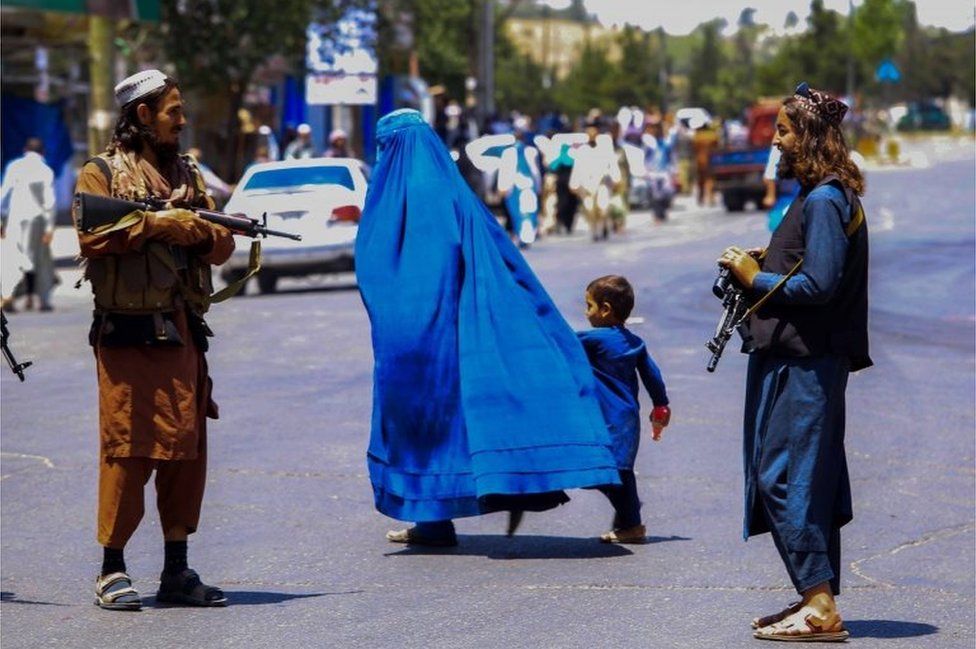
Taliban security guards in Kabul
by Zafar Iqbal Yousafzai 14 November 2023
The resurgence of the Taliban in Afghanistan has not only reshaped the nation’s political landscape but has also presented a formidable challenge to the established norms of international order. The multifaceted ways in which the Taliban violates fundamental principles, ranging from human rights abuses to its support for terrorism and engagement in illicit activities, demand a nuanced examination. In this essay, we delve deeper into these issues to understand the far-reaching implications for Afghanistan and the broader international community.
At the heart of the Taliban’s challenge to the international order lies a stark violation of human rights. The policies enforced by the group, particularly those restricting the rights and freedoms of women, starkly contradict the principles that the international community holds dear. By curbing women’s access to education, employment, and participation in public life, the Taliban not only suppresses individual liberties but undermines the broader principles of gender equality and human dignity.
The Taliban’s suppression of dissent and curbing of free speech add another layer to their human rights transgressions. The stifling of voices that challenge their narrative contradicts the democratic values cherished by the international community. The silencing of journalists, activists, and political opponents not only stifles democratic expression but also undermines the principles of pluralism and free discourse that form the bedrock of democratic societies.
The discriminatory practices of the Taliban against ethnic and religious minorities further exacerbate the erosion of international norms. The principles of inclusivity, diversity, and protection of minority rights are essential components of the international order. The Taliban’s actions in this regard not only violate these principles but also foster an environment of fear and exclusion, hindering the establishment of a just and equitable society.
Beyond human rights, the Taliban’s historical and alleged links to terrorist organizations constitute a severe challenge to global security. The historical collaboration between the Taliban and groups like al-Qaeda raises concerns about the group’s continued associations with global terrorist entities. The implications of this nexus for regional and global security cannot be overstated, making the Taliban’s role in supporting terrorism a critical concern for the international community.
The Taliban’s engagement in illicit activities, particularly in the drug trade and organized crime, represents another facet of their disregard for international norms. The profits generated from drug trafficking not only sustain their activities but also contribute to regional instability. The involvement in organized crime further complicates efforts to establish the rule of law, making it difficult to forge a path toward a stable and lawful society.
Furthermore, the Taliban’s blatant violations of international humanitarian law, including the targeting of civilians and non-combatants, demand global attention. Their recruitment and use of child soldiers not only contravene international standards but also perpetuate cycles of violence and perpetrate harm upon vulnerable populations. Attacks on cultural sites, undermining the preservation of humanity’s shared cultural heritage, constitute another layer of transgression against established international norms.
The group’s reluctance to engage in peace talks and diplomatic resolutions, coupled with their failure to adhere to international agreements, presents a significant obstacle to establishing a stable government in Afghanistan. Their resistance to diplomatic solutions prolongs the conflict, impedes the establishment of a government that adheres to international norms and principles, and raises questions about their commitment to forging a peaceful and inclusive future for Afghanistan.
Moreover, the involvement of external actors supporting the Taliban adds a layer of complexity to the challenge. The examination of the role played by foreign entities sheds light on the intricate web of alliances sustaining the Taliban. This external support has implications for international relations, impacting diplomatic ties between nations. Efforts to hold external supporters accountable become crucial in ensuring that the international community works together to address this multifaceted challenge.
In conclusion, the Taliban’s violations across multiple fronts present a complex challenge that demands unity and coordinated efforts from the international community. Addressing these issues is not only crucial for Afghanistan’s stability but also for upholding the principles of international order that bind nations together. The need for accountability, diplomatic efforts, and collective action becomes paramount in the face of this intricate geopolitical challenge. The international community must navigate these complexities with a steadfast commitment to human rights, peace, and the principles that form the foundation of a just and equitable global order.
